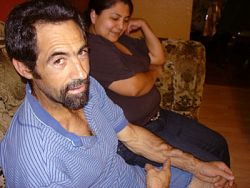Man copes with kidney failure, hopes to get organ donation

SALT LAKE CITY— Even though Pascual Reynoso cannot play soccer anymore, he is still a huge fan of this sport. When I got to his house, the match Atlas, Reynoso’s team, vs. Lanus was on the television screen. He was attentive to all of my interview questions, but at the same time he could not avoid looking at the score. "This is a match for the Libertadores Cup. The ones in white are Atlas. We’re winning 1-0," he said. Then he continued, "I’ve always had a healthy lifestyle. I’ve never tried drugs, smoked, or drank, and I’d play soccer on the weekends," he said. It was precisely during his soccer matches that he noticed a change in his health. "My gums and head would hurt, my feet would get swollen," he said. Then, in May 1999, he had a headache he could not bear and asked his wife to take him to a nearby clinic. "He said the pain was so strong, he’d cut off his head if he could. So I took him to the clinic, and by the time we got there, he was blind. He later had a seizure… the doctor said he might have a tumor and that he needed to be transferred to the hospital," said his wife. Reynoso said he had blood pressure of over 500 and that he was blind for about three days. But there was no tumor. "The doctors told me my kidneys were operating at ten percent of their capacity. I needed a transplant," he added. One of his three children’s godmothers promised the patron virgin of her hometown, Cotija, Michoacan, Mexico, that if Reynoso got a kidney transplant, he would visit her small parish in Cotija. And about two years after he was diagnosed and a year after the promise, he had a kidney. "I thank the person who died, and his family for giving me the opportunity to have a functioning kidney," said Reynoso. Unfortunately, Reynoso’s body started to reject the kidney and after more than three pain-free years, he was back in the hospital. "I started to feel the kidney was decomposing inside me and that it was poisoning me. I asked the doctors to take it out, but they didn’t until I lost a lot of weight due to the vomiting and the diarrhea," he said. "I felt like a weak, old man and had to stop working for over a year." This situation forced Reynoso to sell the dream house he was constructing in Mexico. "It made me change all my plans. By now, I’d be living in my house," he said with melancholy. "I can’t even travel to Mexico to visit my family anymore, because I have to get dialysis." Reynoso has on his arm several fistulas, which look like small humps and are the access for dialysis. He undergoes this process three times a week for a period of three hours and takes 22 pills daily; however, he finds time and energy to serve the Church. He is a lector at Guadalupe parish and helps at the parish’s kitchen six times a year. "We make chile verde, tamales, menudo, tacos, and other dishes. The money we make is for the parish," said Reynoso. He is also a construction worker and says he can do the same kind of work he used to before his kidneys failed; but he does get tired more quickly and is still hopeful for a life without having to purify his blood. "Getting another transplant would be like coming back to life. I’d make plans and I’d travel. I can’t make any plans right now because I can’t get away from the dialysis machine," he said. Reynoso has been waiting for a second transplant for 3 years. Rocío Mejía, Hispanic outreach coordinator for Intermountain Donor Services, says Reynoso’s long wait is due to the lack of donors. Still, Reynoso is optimistic and thinks of this situation as a learning experience that has taught him about the need to help and be helped by others. "If we can save other lives, then we should because someday we, or someone in our family, might need help too," he said. The Catholic Church also encourages organ donation . Pope John Paul II said it was "an authentic act of love." Pope Benedict XVI has said that organ donation is "... a gesture of love morally licit as long as it is a free and spontaneous act."
© Copyright 2025 The Diocese of Salt Lake City. All rights reserved.

Stay Connected With Us